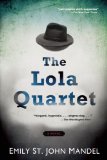Summary | Excerpt | Reviews | Beyond the Book | Read-Alikes | Genres & Themes | Author Bio

This article relates to The Lola Quartet
Emily St. John Mandel's writing includes essences of old-fashioned noir. But what is noir?
"Roman noir" is a French expression that literally translates as "black novel." Historically, the term was used to describe Gothic novels set in the UK, however, its contemporary usage refers to an American invention - the hardboiled thriller. Generally, "hardboiled" means that the novel includes an element of crime, usually with a detective at the center of the action. The style was introduced in the 1920s by authors such as Carroll John Daly and was made widely popular in the late 1930s by Raymond Chandler.
 The label "noir" or "hardboiled" is closely related to the evolution of "pulp-fiction" in America, initially meant to describe a series of stories that would be published in succession by a magazine, or printed in small paperback runs and distributed in weekly installments. The so-called "hardboiled" detective would not only solve crimes, but also act as hero, frequently saving people in distress or defusing dangerous situations. Hardboiled detectives don't sit behind a desk looking at files; they're in on the action.
Today, "pulp-fiction" is often used to describe any kind of popular crime novel.
The label "noir" or "hardboiled" is closely related to the evolution of "pulp-fiction" in America, initially meant to describe a series of stories that would be published in succession by a magazine, or printed in small paperback runs and distributed in weekly installments. The so-called "hardboiled" detective would not only solve crimes, but also act as hero, frequently saving people in distress or defusing dangerous situations. Hardboiled detectives don't sit behind a desk looking at files; they're in on the action.
Today, "pulp-fiction" is often used to describe any kind of popular crime novel.
Many Americans were first introduced to the French word "noir" as the French film style of the 1940s and 1950s became popular. American movie critics lifted the term, purportedly coined in 1946 by Nino Frank, but it wasn't until years later that "noir" would be used to describe works of literature.
 In the 40s and 50s, this type of film became popular with American audiences and incorporated what would become the quintessential stylistic elements of the genre: a pared-down, often black-and-white visual style adopted from German Expressionism of the 1920s, a story that involves a crime, a victim and a detective, and often undercurrents of sexuality involving the necessary femme fatale.
In the 40s and 50s, this type of film became popular with American audiences and incorporated what would become the quintessential stylistic elements of the genre: a pared-down, often black-and-white visual style adopted from German Expressionism of the 1920s, a story that involves a crime, a victim and a detective, and often undercurrents of sexuality involving the necessary femme fatale.
"Noir" can be a dangerous word in literature, associated as it is with the word "genre," which, in recent years, has become akin to "not literary." Yet, the mystery/crime sections of bookstores everywhere are consistently among the highest grossing, and I don't think fans of James Ellroy, Patricia Highsmith, or Stieg Larsson would argue that their novels aren't "literary."
For more specific information on the topic, check out our "Beyond the Book" feature entitled Hardboiled vs. Noir.
Filed under Books and Authors
![]() This "beyond the book article" relates to The Lola Quartet. It originally ran in May 2012 and has been updated for the
April 2013 paperback edition.
Go to magazine.
This "beyond the book article" relates to The Lola Quartet. It originally ran in May 2012 and has been updated for the
April 2013 paperback edition.
Go to magazine.
Your guide toexceptional books
BookBrowse seeks out and recommends the best in contemporary fiction and nonfiction—books that not only engage and entertain but also deepen our understanding of ourselves and the world around us.